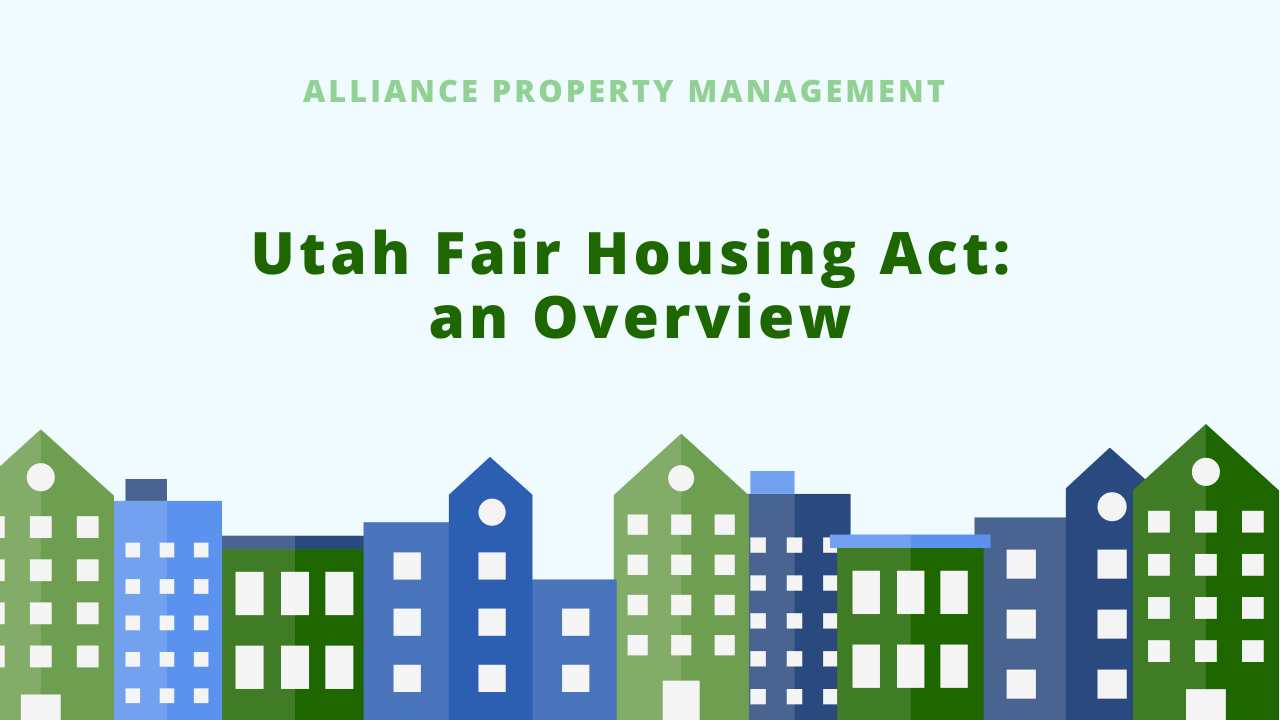
The Fair Housing Act (FHA) mandates all housing-related activities to be free from discrimination on the basis of certain protected characteristics. When renting out your rental, for instance, the act requires that you do so fairly and consistently.
And landlords aren’t the only ones required to abide by the FHA. Lenders and home sellers must also ensure their housing-related transactions are devoid of discrimination, as well.
What is the state's FHA? How did it come about? Who enforces it? How can a housing provider avoid violating the act? If you’ve been asking these questions, then you’ve come to the right place. Below is everything you should know about the Utah Fair Housing Act as a landlord as per the Utah law.
What is the Fair Housing Act?
The Fair Housing Act is an important piece of legislation that grants fair housing protections and rights to renters.
The FHA was passed by Congress in 1968 and signed into law by President Lyndon Johnson—the president at the time. The passage came a week after the assassination of Dr. Martin Luther King, Jr. The 1968 law prohibited discrimination on the basis of four classes: race, color, religion, and national origin.
In 1974, the first amendment to the act was made, which added gender to the list of protected classifications. Later, familial status and disability were added in 1988. So, in its current form, the FHA prohibits discrimination on the basis of 7 classes. That is, race, color, religion, nationality, gender, disability, and familial status.

Many state legislatures have also found the federal list of protections don’t offer adequate fair housing protections. Consequently, some have expanded the federal list by including additional classes. The Utah FHA has three additional protections: sexual orientation, and gender identity or expression.
What Types of Homes Does the Utah Fair Housing Act Cover?
The Fair Housing Act generally applies to all housing types that are rented, leased, or sold. That, therefore, includes condominiums, single-family homes, mobile home parks, and homeowners’ associations.
There are exemptions, though. In some rare circumstances, the act makes the following exemptions.
• Single-family homes that are sold or rented by the owner without an agent
• Housing that religious organizations operate like churches or mosques
• Membership-limited private clubs
• Owner occupied buildings with a maximum of four units
In What Ways Can a Landlord Discriminate Against a Renter?
Housing discrimination can take many forms. The following are common examples.
• Stating that your home is unavailable for renting because of a renter’s race, color, national origin or religion.
• Requiring a renter to pay extra for having children
• Failing to make a reasonable modification or accommodations for people living with a physical or mental disability. An example being denying a person with an assistance animal to rent the unit.
• Sexually harassing your renter
• Refusing to rent your vacant to a qualified prospect without a justifiable reason
• Making adverts in a rental advert that shows limitation, preference, or discrimination based on someones protected classes including but not limited to their national origin, religion, sex, or familial status.
• Providing different terms, privileges or conditions to different residents
• Harassing, coercing, intimidating, or interfering with your tenant’s exercise of their fair housing rights
What Rights Do Disabled Tenants Have in the State of Utah?
Disability is one of the protected classes under the FHA. Under the act, the disability must either be physical or mental, and must significantly limit one or more life activities.

A disabled tenant has a right to make reasonable modifications to their rented home. The change must, however, be reasonable and necessary to make the tenant’s life comfortable and enjoyable. The tenant must also make them at their own expense.
In addition, as a Utah housing provider, you must not refuse to make reasonable accommodations to your policies, rules, and practice that may be necessary to allow the tenant use their rented premises. For example, even with a no-pet policy, you must allow a visually impaired tenant to keep their guide dog.
Also, do you rent a building that has at least four units? If so, there are special requirements that you may need to familiarize yourself with. They are as follows.
• Hallways and doors must be wide enough to accommodate access by wheelchairs
• Common and public areas must be accessible to disabled people
For all other residences, they must have:
• Reinforced bathroom walls that can accommodate installation of grab bars
• Accessible thermostats, outlets, light switches and environmental controls
• Accessible routes in and throughout the residence
• Kitchens and bathrooms that can accommodate wheelchair-laden people
There are also certain squatters' rights that you should be aware of.
How Can Utah Housing Providers Avoid Potential Discrimination Lawsuits from their Tenants?
If you are found guilty of discriminating against your renter, you may be liable to paying your renter both compensatory and punitive damages. Compensatory damages a renter can seek include the costs of moving, storage, as well as others such as emotional distress. Evicting a tenant due to discriminatory reasons is also illegal.

In addition, litigating involving fair housing is often costly and time-consuming even if you eventually prevail in a case.
To avoid finding yourself in such a legal quagmire, the following are a couple of tips you may need to keep in mind.
• Draft proper ads. Your ad should focus on describing the property’s features rather than on the traits of the renter you’re looking for. This way, you’ll be able to avoid including discriminatory statements such as “Perfect for a Young Professional” and “Ideal for a Married Couple.
• Screen prospective tenants the right way. Landlords have a right to choose the type of renter to rent to. After all, difficult tenants can be nothing but trouble. As you do the tenant selection exercise, however, it must be devoid of discrimination on the basis of protected classes.
• Treat all tenants equally and fairly. Even in the everyday running of your rental, the FHA requires that you treat all tenants equally and fairly. If it takes you an hour to respond to a maintenance request, then do so for everyone as well.
Bottom Line
Do you still have more questions regarding the state's Fair Housing Act? If so, our team can help. Alliance Property Management is the #1 choice for property owners in Ogden. We understand all legal responsibilities a housing provider has and can help you achieve peace of mind.
Disclaimer: This article is not a substitute for legal advice, nor does it advertise being such. If you have any issues with the law pertaining to the management of your rental, the FHA, or anything else, please consult a professional attorney about these issues.
